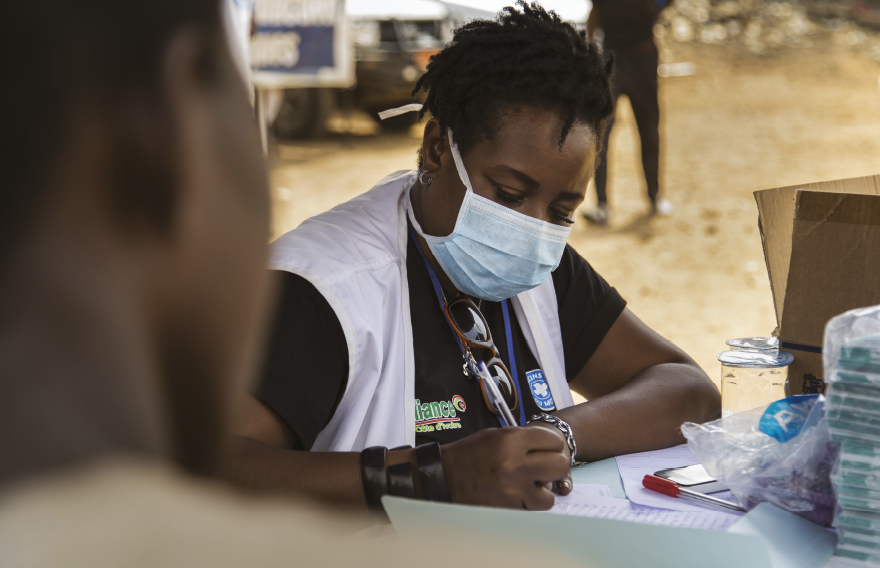
Helping health systems respond to Covid-19
Expertise France is fully committed to supporting partner countries in defining appropriate responses to the Covid-19 crisis. © Anna Surinyach
PR CHOUA OUCHEMI
Coordinator of the Covid response in Chad
« Thanks to Expertise France’s Covid-19 platform, we have had access to both a literature review and specific training webinars as of June 2020. These training courses were highly appreciated when it came to providing expertise to our healthcare personnel through continuing education, especially in the field of laboratory operations and oxygen therapy. We also received coordination assistance through the provision of five international experts for the Covid response. »
ANTOINE PEIGNEY
Director of the Health Department, Expertise France
“When the Covid-19 emergency arose, Expertise France immediately took action. Our first priority was to provide access to safe and verified information on the Covid-19 platform, offering documentation about the disease, its modes of transmission, existing tests and potential treatments. Secondly, L’Initiative sida, tuberculose et paludisme adapted its activities by launching technical assistance missions aimed at helping countries access Covid-19 funding from the Global Fund and secure additional funding for projects already being supported.”
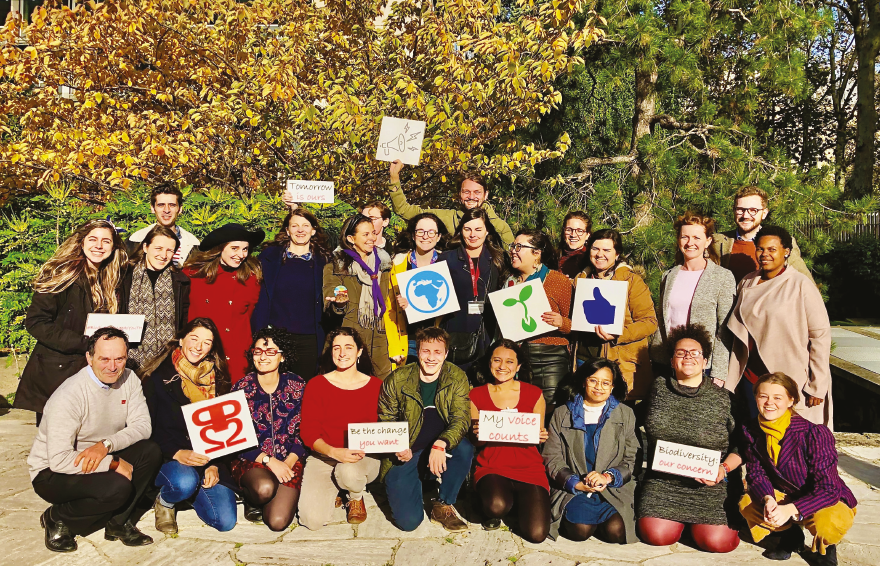
Supporting wide-ranging international strategies with the support project to the preparation of the COP 15 agreements of the Convention on Biological Diversity in China
The Post-2020 Biodiversity Framework – EU Support project facilitates the mobilisation of youth representatives in view of the negotiation process preparing the 15th Conference of the Parties (COP 15) of the Convention on Biological Diversity (CBD). © Jules Bismuth
SABINO FRANCIS OGWAL
Co-Chair of the negotiation process, Uganda
“The Post-2020 Biodiversity Framework – EU Support project facilitates the preparation of the negotiations leading to the next COP 15 of the CBD (Convention on Biological Diversity) along with negotiators from State Parties, through meetings and thematic workshops. It also supports the coordinated mobilisation of youth representatives, local and regional authorities, corporate stakeholders and environmental NGOs in an effort to achieve an ambitious new global strategy for biodiversity.”
DIDIER BABIN
Expert at the Sustainable Development Department, Expertise France
“In keeping with our partnership with the European Union, we act as an interface between the diverse stakeholders that are negotiating the next global agreement on biodiversity to be struck in China in 2021. Our role is also to listen to the needs of negotiators from specific countries, as well as to identify subjects that require more informal discussions, which we can organise to facilitate the upstream process and pave the way for its ambitious outcome and effective implementation.”
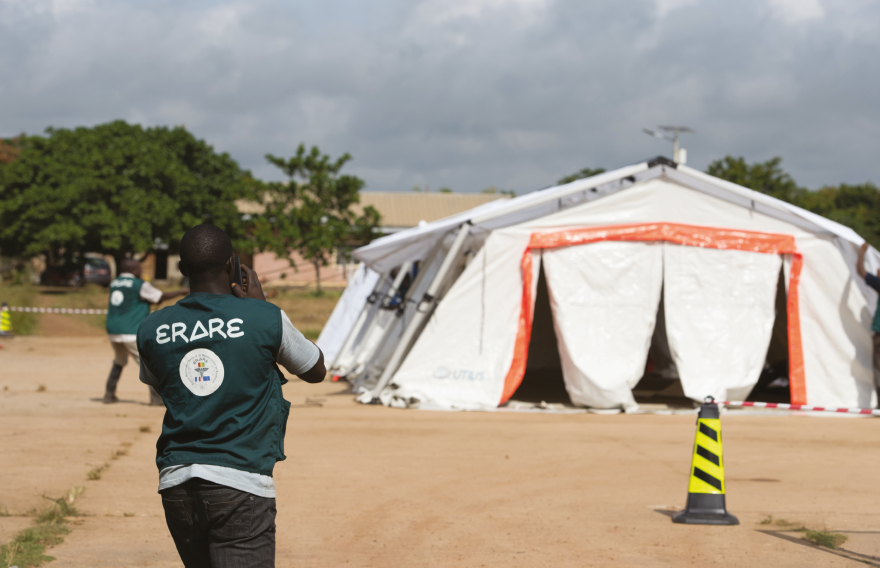
Strengthening health systems to improve their epidemic response capacity
THE EXAMPLE OF GUINEA
Through the PREPARE project, 200 regional staff in Guinea were trained to prevent, monitor, investigate and feed back information to ensure quick response to epidemic outbreaks. © Julien Geay
DR. SAKOBA KEÏTA
Director General of Guinea’s National Agency for Health Security (ANSS)
“The aim of PREPARE was to strengthen our surveillance and warning capacities at all levels, from communities to national health teams, so that everyone was empowered to effectively contribute to epidemic responses. Working with experts in emergency protocols, we developed an alert system adapted to the Guinean context.
We introduced systematic sampling from the very onset of the epidemic and developed a community survey protocol so that the health alert could be triggered early on in the event of an epidemic outbreak.”
SANDRINE SEGOT-CHICQ
Technical Expert in infection prevention & control and hospital hygiene
“Thanks to the PREPARE project, funded by the European Union and France, ERARE intervention teams are now in place in the 8 administrative regions of Guinea to strengthen the Ministry of Health’s warning and response mechanism under the lead of the ANSS, in keeping with International Health Regulations (IHR). Their missions have been adapted to the national strategies under development and integrate the ‘One Health’ concept. ERARE teams contribute to the improvement of epidemiological surveillance.
In alert mode, they support districts from early investigation to response; in routine mode, they play a supervisory role and provide ongoing training.”
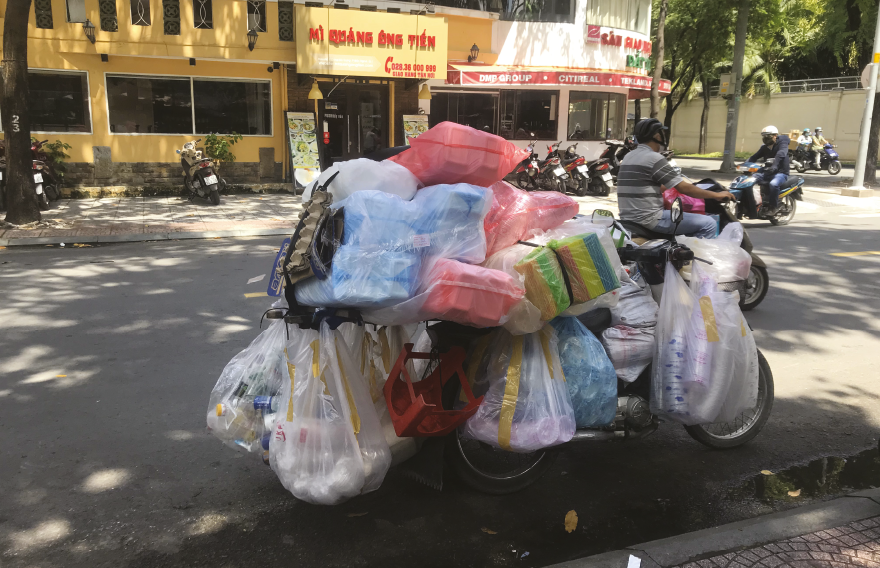
Responding to a global challenge through local actions aimed at combatting plastic use in 7 countries across East and South-East Asia
Ho Chi Minh City, October 2020. Alongside the Vietnamese authorities, Expertise France combats the use of single-use plastic bags and resulting marine pollution through the Rethinking Plastics project.
© Fanny Quertamp
KIM THUY NGOC
Coordinator of the “Establishing a supermarket alliance to reduce the use of disposable plastic bags in Vietnam” pilot project (2020-2022)
“Thanks to the technical and financial support received from Expertise France and the European Union, ISPONRE (Institute for Strategies and Policies for the Management of Natural Resources and the Environment) is tackling the use of disposable plastic bags in Vietnam through a pilot project that aims to set up a coalition of supermarkets committed to fighting against plastic waste,
while carrying out visible actions to promote eco-friendly alternatives and changing consumer behaviour regarding the environment. This project will enhance the sustainability of retail trade in Hanoi and across the country.”
FANNY QUERTAMP
Coordinator of the “Rethinking Plastics: Circular Economy Solutions to Marine Litter” project in Vietnam
“In Vietnam, Expertise France is committed
to combatting plastic pollution through four key actions aimed at reducing the production of single-use plastic bags, promoting eco-packaging and strengthening marine pollution reduction schemes in commercial and fishing ports. These pilot projects, combined with feedback from European experiences, help to inform the government’s strategic thinking as well as the development of new national circular economy measures.”
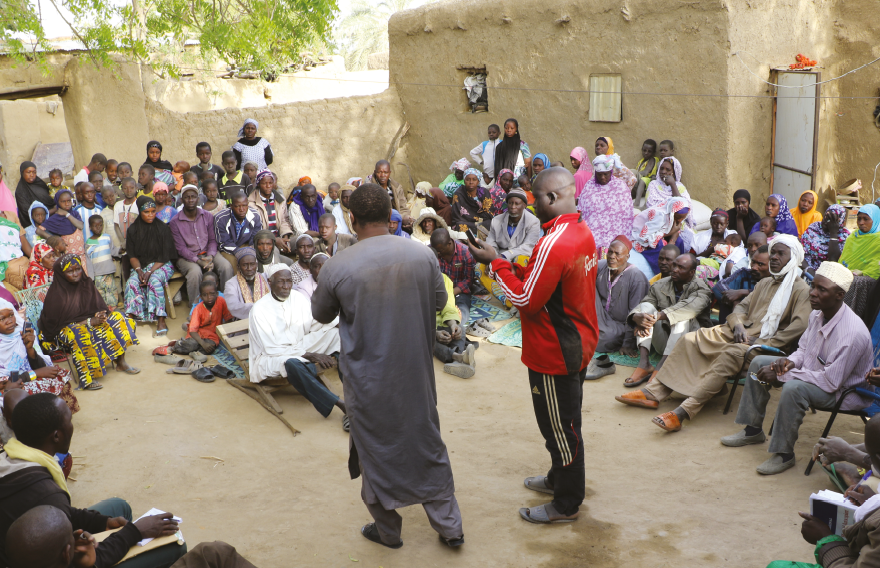
Adapting solutions to the needs of the field and populations
THE EXAMPLE OF MILITARY-CIVILIAN INFIRMARIES IN MALI
Within the framework of the PARSANTE project, in Mali, a study was carried out to report on how beneficiaries perceived the construction of military-civilian infirmaries in garrisons.
© Malian Institute for Research and Action for Peace (IMRAP)
COLONEL ATTAHER. MAIGA
Commander of Armed Forces in Hombori
“This infirmary is intended to be run by both militaries and civilian nurses and doctors.
From a social perspective, we will receive a
much more mixed range of patients. We mean
to continue working in that direction in order to reinforce the trust and confidence that already exist between the military and civilians.”
GABRIELLE HERSENT
Project Officer at the Health Department, Expertise France
“Here in Mali, health systems strengthening and access to healthcare are viewed by society as a means of resilience and dialogue. By strengthening a basic public service like healthcare, the project works to bring together different groups and rebuild the social fabric. PARSANTE is an EU-funded programme that supports the resumption of health services in combat zones in Mali using
a crosscutting approach based on various health
and safety issues, while promoting an innovative and long-term course of action. In this context, international cooperation works as a tool that supports dialogue and contributes to the structuring of society over the long term.”
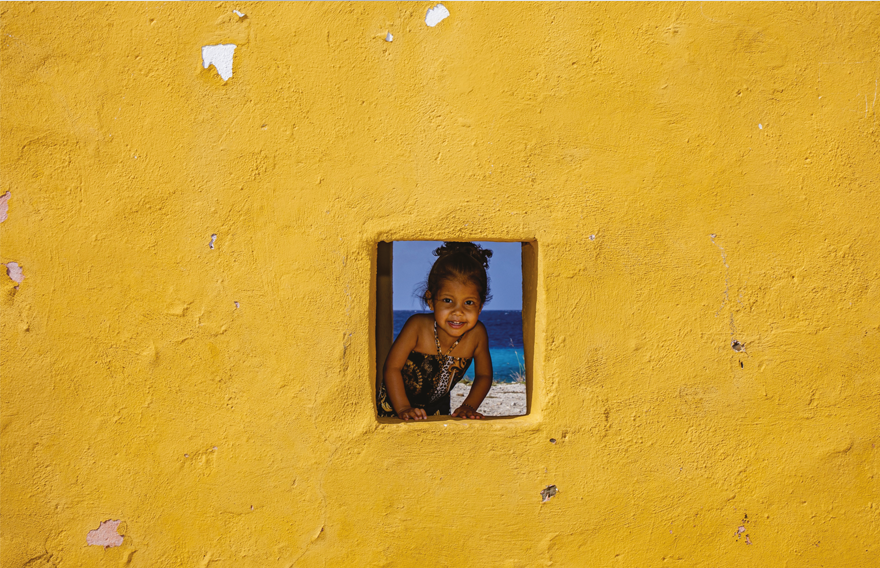
Strengthening the resilience of territories by reconciling human development and environmental sustainability
THE EXAMPLE OF THE CARIBBEAN OVERSEAS COUNTRIES AND TERRITORIES
Implemented with stakeholders from all Caribbean Overseas Countries and Territories (OCTs), the ReSEMBiD programme aims at reconciling human development and environmental sustainability to ensure the prosperity of future generations. © Casper Douma
SILVERIA JACOBS
Prime Minister, St. Maarten
« St. Maarten’s development vision is to be a strong, resilient country that will provide an enhanced quality of life and well-being for generations to come. We are advancing this vision with our close partner ReSEMBiD, through projects that strengthen resilience, foster sustainable energy practices and protect our marine biodiversity. Such partnerships enhance our country’s human development whilst protecting its natural environment, thereby securing long term sustainable development. »
ANDREA FLOUDIOTIS
Programme Manager, ReSEMBiD
« We believe that every society should be the architect of its human development path.
At ReSEMBiD we are working closely together
with the Caribbean Overseas Countries and Territories on projects developed from the ground up to advance their human development while conserving their magnificent natural capital.
The programme will strengthen the OCT’s resilience to the COVID pandemic and to extreme weather events, further sustainable energy practices, and protect and restore their marine biodiversity. »
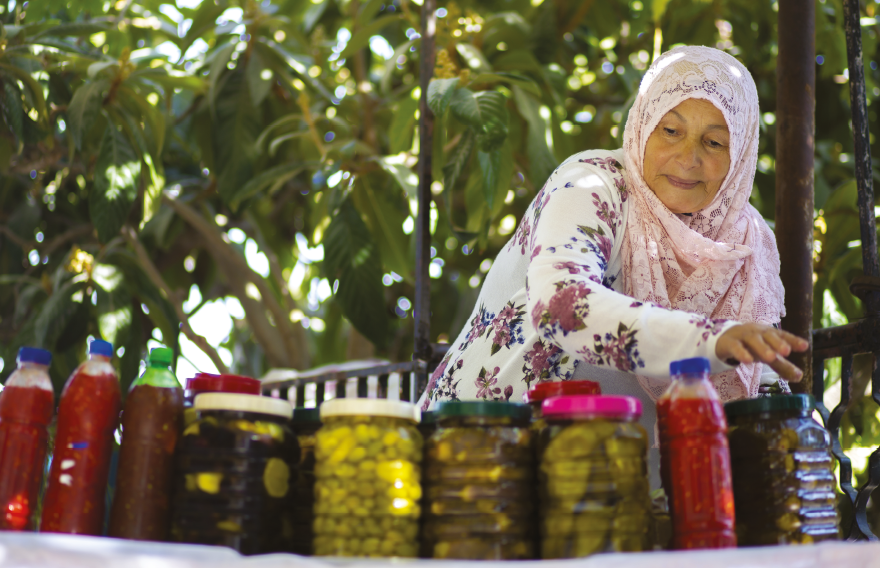
Improving quality and access to social services by building the capacity of civil society organisations
THE EXAMPLE OF SOCIAL PROTECTION IN JORDAN
Expertise France is contributing to the implementation of a vast EU-funded social protection support programme in Jordan, supporting civil society actors in the field of social inclusion.
© Mohammad Magayda
WISAL QSOOS
Head of the Shihan Charitable Society
« Shihan Charitable Society is a local Civil Society Organisation partnering with Expertise France.
Their participatory approach chimes with ours. Along with the Arab Women Organisation (AWO), we were awarded a grant to support women entrepreneurship in Karak, hand in hand with the Ministry of Social Development. It’s not just the funding we need, the capacity building and networking opportunities count just as much.
We believe this is how to achieve successful
and sustainable development in our area. »
MARIE KEIRLE
Programme Manager, ReSEMBiD
“Our approach is to work hand in hand with civil society organisations. Partnerships are at the core of our strategy. As part of a pilot project in Karak, we brought together local stakeholders to engage with the Ministry of Social Development,
our institutional partner. We launched a grants programme that supports projects aimed
at empowering vulnerable groups and strengthening social cohesion among them (focusing on disabled people, women and disadvantaged youth), through the exchange
of good practices and the development of
peer-to-peer learning.”
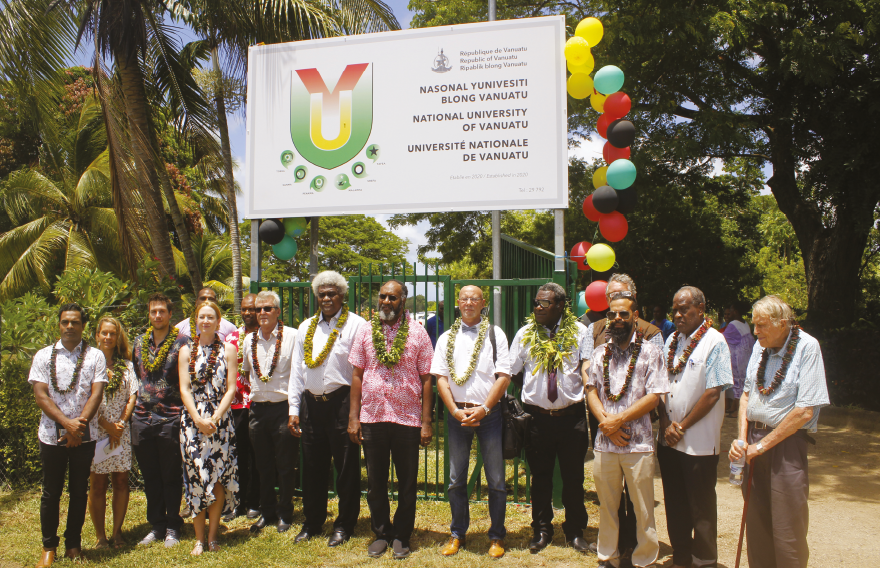
Managing International Technical Experts
FRENCH EXPERTISE DEPLOYED ABROAD
Expertise France manages international technical experts on long-term technical assistance missions. Here, an international expert mobilised in Vanuatu to support the development of higher education.
© Expertise France
JEAN-PIERRE NIRUA
Minister for Education and Training in Vanuatu
“I would like to express my gratitude to Expertise France, the French Embassy in Vanuatu and the Government of New Caledonia for their valuable financial and technical support. Together, we have come a long way, after holding many meetings
and exchanges aimed at building a shared vision
to continue our journey and further preserve the unifying nature of this university. With this first National University, Vanuatu must ensure that it can make its own decisions in the future. This means training our own elites, who also aspire to become international citizens.”
ANNE-SOPHIE VIVIER
International Technical Expert in charge of higher education in Vanuatu
“As an expert in higher education for Expertise France, I have been supporting the development
of higher education in Vanuatu since 2017 and have actively participated in the emergence of the country’s first national university, which was officially inaugurated in January 2020. The National University is the cornerstone of Vanuatu’s national sustainable development plan. It has the peculiarity of being bilingual (French-English), in a country that boasts the highest linguistic diversity in the world. With this project, Vanuatu now has the opportunity to turn its historical heritage into an asset for its development.”
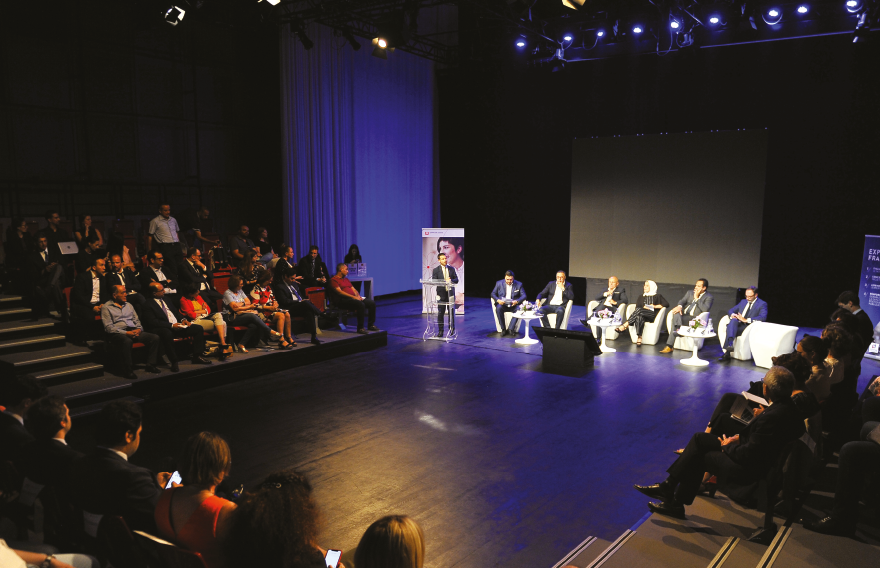
Mobilising our network of French, European and international partners to support international cooperation and development
THE EXAMPLE OF EXPERTISE FRANCE’S CONFERENCES CYCLE “LES RENDEZ-VOUS DE L’EXPERTISE”
With the #RDVExpertise conferences, Expertise France enables diverse and complementary actors to engage in dialogue on international cooperation and development issues. Here in Tunisia, in June 2019.
© Zakaria Chaibi
PHILIPPE JAHSHAN
Director of Coordination SUD
“Expertise France’s approach in partnering with international solidarity organisations is a key feature of our ambition to enrich public know-how with the expertise of French and local civil society. Such an approach allows for stronger action to support the emergence of a human-centred, sustainable, locally-based development that best meets the needs of the field.”
PR FRANÇOISE BARRÉ-SINOUSSI
Nobel Prize in Physiology or Medecine 2008
“Facing the current health crisis and its economic and social impacts, it appears essential to create means of exchange and dialogue between institutions, researchers and operational staff. Sharing know-how is key when it comes to devising the world of tomorrow. In this sense,
the opportunities for dialogue organised by Expertise France are definitely precious and useful.”
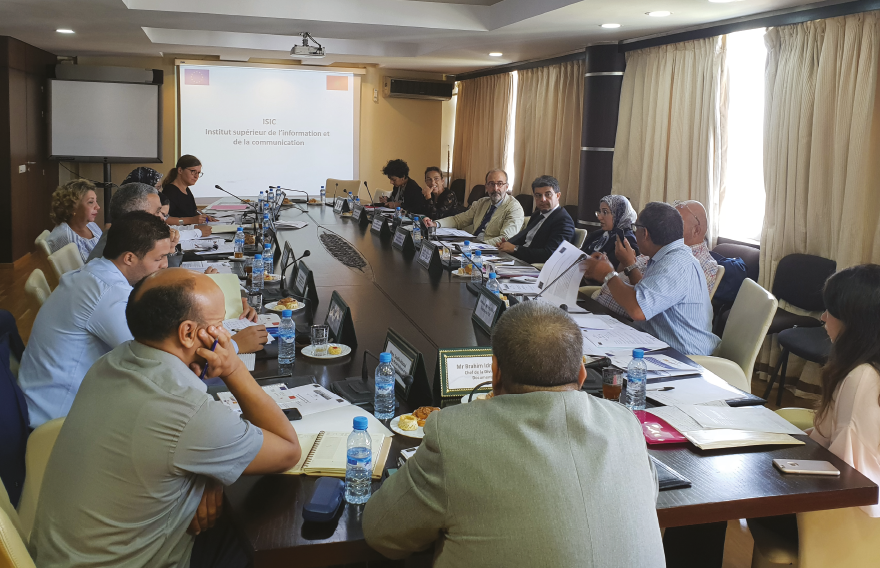
Strengthening peer-to-peer cooperation through European Twinning initiatives
During the second steering committee of the twinning project for the institutional strengthening of the Ministry of Communication and its communications and audiovisual partners in Morocco, in September 2018. © Majda Laaboudi
CHANAZ EL AKRICHI
Project Manager, a beneficiary of the twinning project for the institutional strengthening of the Ministry of Communication and its communications and audiovisual partners in Morocco
“It is a rich, varied and complex twinning project, as it involves three major divisions of the Communication Department, two training institutes, as well as the Moroccan Film Centre. The departments and institutions of France, the leading partner, as well as Italy and Spain, which are active in the field of communications and the audiovisual sector, joined forces to bring the best of their skills and took up the challenge of ensuring that activities were consistent and in line with EU acquis.”
ALICE DAPOGNY
Head of European Twinning Projects and Bilateral Project Management Unit, Expertise France
“Twinning initiatives are peer-to-peer projects stemming from a cooperation instrument between administrations, which can be used by EU Member States to mobilise their public expertise in order to strengthen the capacities of partner States in defining and implementing their public policies. France is currently the main lead for twinning projects at the European level. Any French public
or semi-public entity can entrust Expertise France with the management of a twinning project,
and we have developed specific know-how in supporting the implementation of this instrument, which requires European and French influence.”
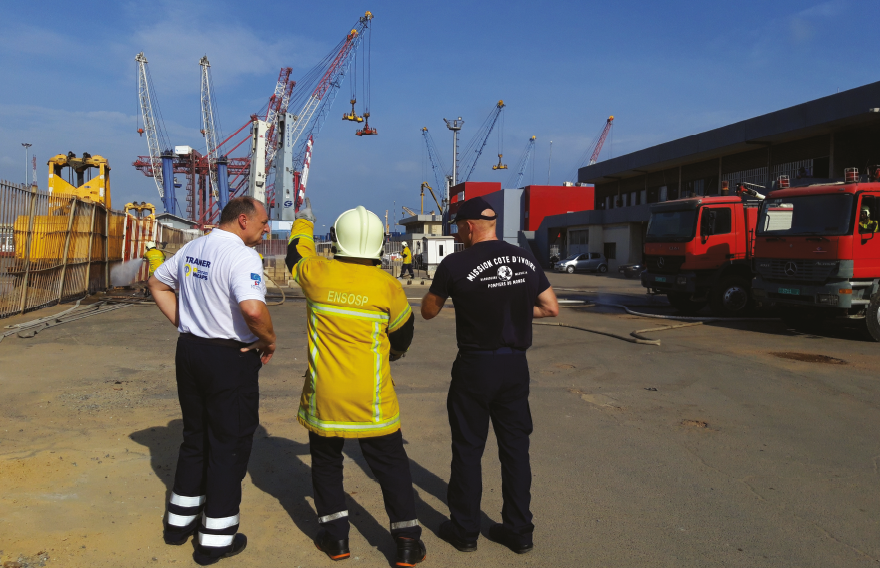
Strengthening port security to fight against traffic, prevent industrial risks and promote the marine economy
THE EXAMPLE OF WEST AND CENTRAL AFRICA
WeCAPS contributes to enhancing the safety and security of ports in West and Central Africa. Pictured here is the project’s civil protection expert together with a Togolese firefighter and a trainer from BMPMonde, a local organization, in the port of Lomé, Togo. © Marion Piccio
ABOUBACAR SEDIKH BEYE
Director of the port of Dakar
“Following the tragic explosions in Lebanon, Senegal became fully aware of the risks related to storing hazardous materials. Therefore, a national plan was drawn up to identify and audit the safety of storage facilities for dangerous chemicals. The Autonomous Port of Dakar immediately took all the necessary steps to be in a position to prevent an accident like the one that occurred in Beirut. We called on WeCAPS, a partner project, to help us identify these risks, undertake prevention activities and provide crisis management training.”
MARIE-CLAIRE BOILLOT
Head of Unit at the Peace, Stability and Security Department, Expertise Franceent Unit, Expertise France
“In port areas, installations that are likely to generate risks are a major issue nowadays, both in terms of environmental protection and human safety, as shown by the terrible incidents in Beirut. Given the risk factors that these critical infrastructures are faced with, Expertise France
is committed, through the European Union’s WeCAPS project, to improving the safety and security of West and Central African ports by helping partner ports become less vulnerable.”
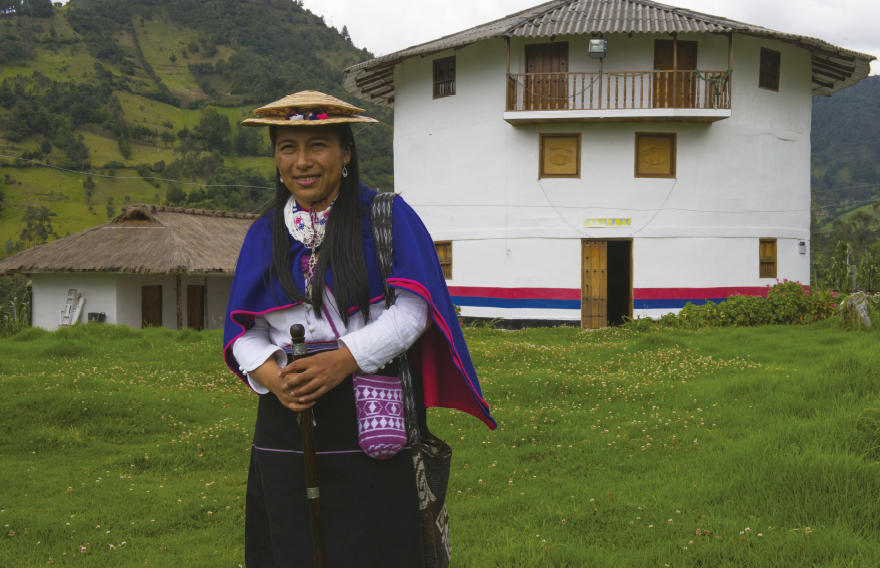
Strengthening public policies that promote gender equality
EXCHANGE OF BEST PRACTICES BETWEEN THE EUROPEAN UNION AND LATIN AMERICA
The gender component of EUROsociAL+, implemented by Expertise France, is aimed at strengthening gender equality public policies in 19 Latin American countries. Here, an action for the rights of rural women in Colombia. © EUROsociAL+
TATIANA ROMERO
Coordinator of the Directorate of Formal Justice, Ministry of Justice and Law, Colombia
“The support provided by EUROsociAL+ European programme helps to improve the recognition of rural women’s roles, the protection of their rights, as well as the resolution of land-related conflicts. Thanks to this support, a mechanism and tools were developed to ensure better access to justice for these women living in rural areas, so that they are empowered to claim their rights to land. One objective was to strengthen institutional actors, and another was to develop and strengthen the role of rural women’s organisations.”
MARIE-DOMINIQUE DE SUREMAIN
Gender Expert at the Governance, Justice and Human Rights Department, Expertise France
“Mainstreaming gender equality and the gender approach in our technical assistance activities means better integrating ministries, inter-ministerial coordination groups and equality-driven organisations among our institutional partners.
It also means enhancing our diagnostics and intervention strategies, strengthening our ability
to stand up against the setback of women’s rights, and building on knowledge, methods and proposals from civil society, universities
and multilateral organisations.”
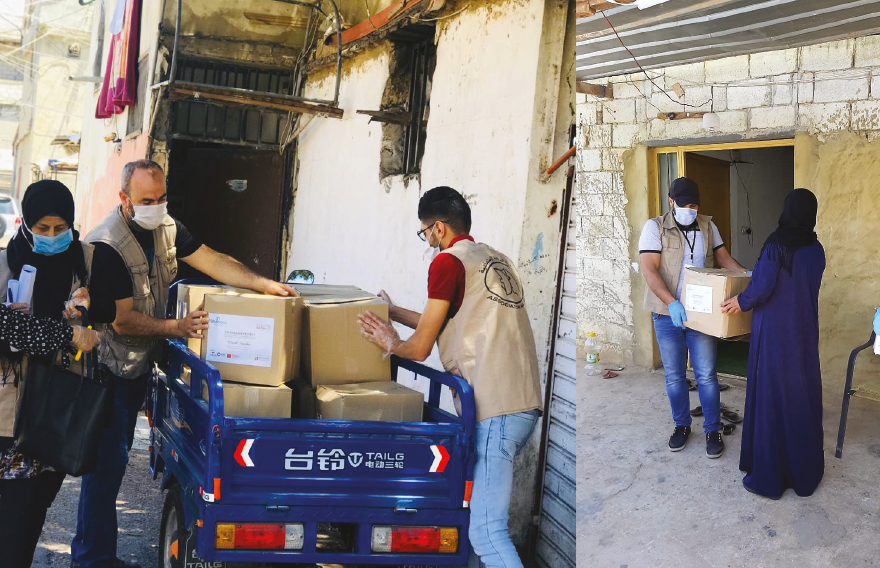
Launching interventions in fragile areas by mobilising our civil society partners
THE EXAMPLE OF STABILISATION PROJECTS IN LEBANON
The Shabake project aims to improve the resilience of civil society in Lebanon, by strengthening its role in crisis prevention and management through the capacity building of 7 Lebanese NGOs.
© Najdeh Association
F.A.
beneficiary at the Ayn al-Hilweh refugee camp in southern Lebanon
“My husband is a construction worker and has no stable income. Most of the time, we have no electricity or running water. Our life has become even harder since the Covid-19 outbreak. The assistance we received from Najdeh through the Shabake project has been very precious to us. It was the first time we had access to such a variety and quantity of food. I felt so happy when I saw the « Tuk-Tuk » of the association arrive to our house!”
MALAKE EL TURK
Expertise France Programme Director in Lebanon
“Given the multiple crises that Lebanon experienced in 2020, from economic and political turmoil to the Covid-19 pandemic and
the explosions in the port of Beirut, the Shabake project, funded by Danida (Denmark) and the Agence française de développement (AFD) within the framework of the Middle East Minka Initiative,
is uniquely positioned to support civil society actors in responding to emerging needs in a timely and meaningful manner. Expertise France’s team in Lebanon is proud to be taking part in this initiative and to be able to work with dedicated local partners on the ground.”
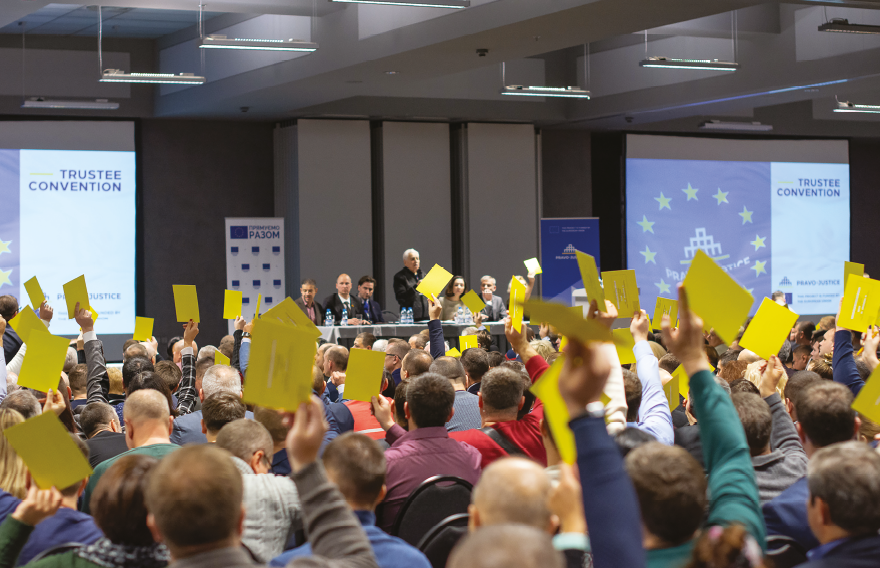
Strengthening legal and judicial systems to reinforce the rule of law
THE EXAMPLE OF UKRAINE
Funded by the European Union and implemented by Expertise France, the Pravo-Justice project aims to support reforms in the justice sector in Ukraine. © Andriy Kuzmin
VALENTYNA DANISHEVSKA
Head of the Supreme Court of Ukraine
“The Supreme Court of Ukraine was created with support from the Pravo-Justice project. As a leading international partner, Pravo-Justice supported not only the selection of the Court’s 200 judges, but also the development of its regulatory and procedural framework, the implementation of tools to automate case-law search, as well as the improvement of reasoning structure and content
in decision-making. The Pravo-Justice project also increased judges’ knowledge of the application
of EU law and promoted the emergence of a more independent, accountable, skilled and efficient Supreme Court.”
CVIJETA JEKIC
Deputy Director of the Governance, Justice and Human Rights Department, Expertise France
“The architecture of the Pravo-Justice project gives concrete expression to Expertise France’s approach in the field of justice, in order to illustrate its richness and challenges: defining and adopting
a strategy that involves all the stakeholders of the justice system – from investigation to enforcement of court decisions – alongside national evaluation, steering and strategic planning mechanisms designed to ensure its sustainability.”
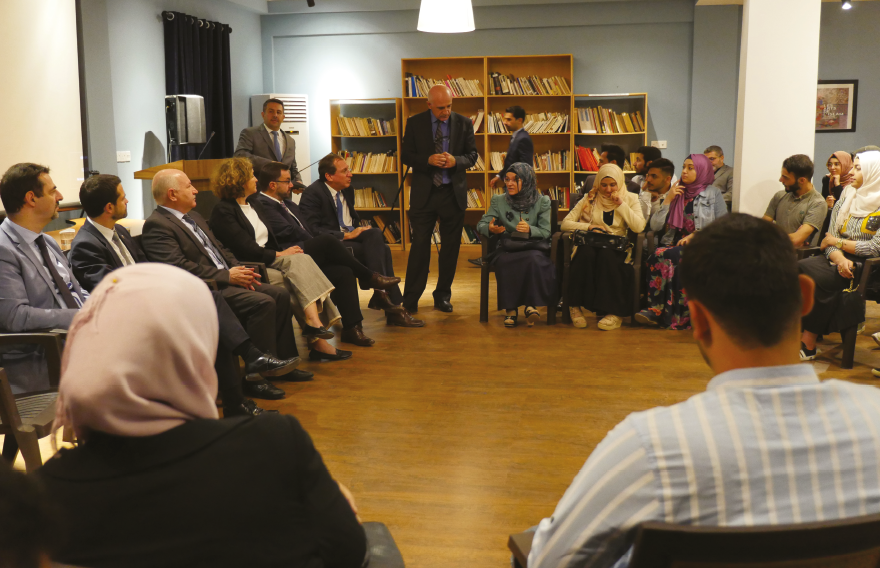
Supporting territorial recovery and stabilisation by investing in youth
SUPPORT TO UNIVERSITIES IN MOSUL
On 6 October 2019, the 22 laureates of the « Mosul Student Contest » presented their projects at the Franco-Iraqi Cultural Institute in Mosul. © Sofia Nitti
M. A. Y.
Computer engineer
“We developed the Mosul_Space App to promote and disseminate educational workshops on
a variety of themes: engineering, medicine, technology, etc. We launched this project in order to instil a better approach to technology in Mosul and to develop skills among youth. In the future,
we aim to further develop the app so that it can host online courses, and we intend to establish partnerships with a number of public and private universities.”
FABRICE BOUSSALEM
Head of Expertise France’s Office in Iraq
“Expertise France opened its first office in Iraq in October 2019. Acting as a platform, this office facilitates the coordination of France’s response by involving other institutions, operators and initiatives committed to the reconstruction of Iraq.
In particular, Expertise France is implementing a project funded by the Crisis and Support Centre of the Ministry for Europe and Foreign Affairs
to support the universities of Mosul and Nineveh. This project saw the launch of the « Mosul Student Contest », a competition that allows students to receive technical support and funding for initiatives aimed at revitalizing their campus life and professional integration.”
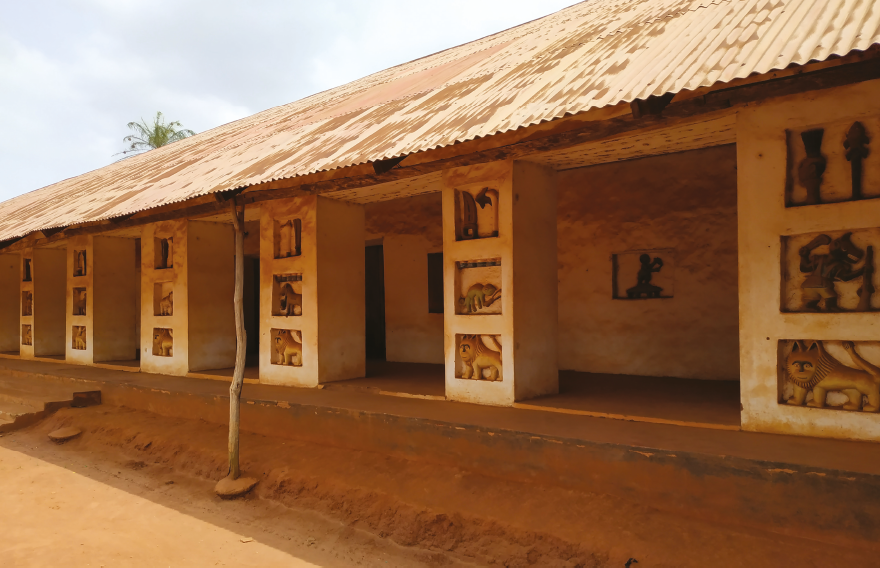
Enhancing cultural heritage to foster economic development and mutual understanding between societies
THE EXAMPLE OF BENIN
The Palaces of Kings Ghézo and Glélé are the major feature of the Royal Palaces of Abomey, a heritage site in Benin which is at the heart of an ambitious restoration and enhancement project funded by the Agence française de développement (AFD) and implemented by Expertise France. © Guillaume Buresté
ALAIN GODONOU
Director of the Museum Programme at Benin’s National Agency for the Promotion of Heritage and Tourism Development
“With Expertise France and AFD, we are working
on a project to create the Museum of the Epic of Danhomè’s Amazons and Kings. This initiative falls within the context of the government’s 2016-2021 « Benin Revealed » action programme, which includes tourism and culture as a major feature
to support sustained, inclusive and sustainable growth through the enhancement of territories
and heritage.”
CLARA DELMON
Coordinator of the Culture and Heritage Unit, Governance, Justice and Human Rights Department, Expertise France
“The mission of the Culture and Heritage Unit is to design and implement projects aimed at structuring cultural policies, enhancing Beninese heritage,
and supporting cultural and creative industries. As a key to economic and social development as well as a token of peace and mutual understanding, culture is a pillar of technical cooperation for sustainable development.”
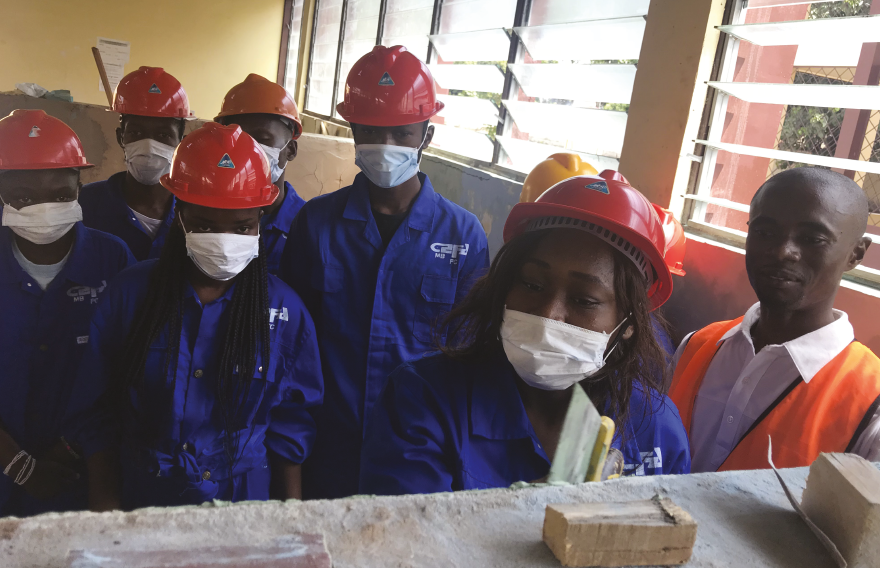
Strengthening and developing vocational training centres based on the experience of French training institutes
ILLUSTRATION IN THE REPUBLIC OF CONGO
The ARCEFA project, funded by AFD, aims to promote access to employment and foster the economic development of the Republic of Congo by supporting formal training via the country’s network of CEFAs (Education, Training and Apprenticeship Centres). © Laurent Du Rusquec
GLAWDYS AUDREY MADINGOU
Director of Congo’s Construction, Refrigeration and Air Conditioning CEFA
“Since 2015, Expertise France has provided our Centre for Education, Training and Apprenticeship (CEFA) with technical support in administrative
and pedagogical management of sandwich courses. We particularly appreciated their methodology and mechanisms in terms of strategy implementation for both the training process
and its different stages, from needs analysis to post-training follow-up. The tools we were able to create thanks to Expertise France’s support make us different and give back confidence to students, companies and senior management.”
FRANÇOIS SANCHEZ
Training Adviser in charge of the coordination of experts, Académie de Limoges
“Expertise France entered a partnership with Limoges’s regional education authority to support the launch and development of Congo’s CEFA network. Within the framework of this partnership, experts were mobilised in order to train trainers on the skills-based approach applied to vocational training, in each of the 15 sectors covered. Furthermore, Congolese master teams received technical support in project management as well as administrative and pedagogical management of sandwich courses.”
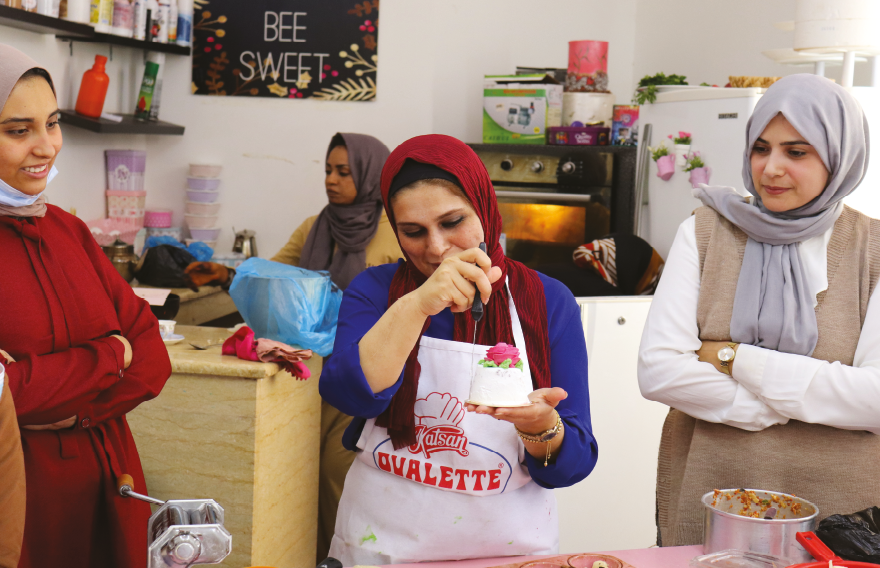
Supporting economic development in sensitive areas to facilitate the revival of territories
THE EXAMPLE OF ENTREPRENEURIAL PROJECTS IN LIBYA
Stream, a project funded by the UK government, is an incubator that supports the development and capacity building of Libyan start-ups and young companies. © Ayoub Almaadani
SARAH HAMED
Founder of the Sara Center for Sweets, a pastry school
“My experience with the Stream project was one of the most rewarding in my career. I was able to design a real roadmap, laying down all the foundations for my company and defining the specific roles of all my employees. Stream opened a number of doors for me, and today I owe my success to the knowledge and advice that I received from the Stream team.”
ALEXANDRE CHÂTILLON-MOUNIER
Programme Director at the Economic and Financial Governance Department, Expertise France
“With Stream, Expertise France has set up a unique meeting space for talented entrepreneurs, technical experts, government officials and investors. Launched in the midst of the civil war,
Stream is more than just a support programme
for entrepreneurs: it is both a tool that brings communities together and a place for technical
and intellectual innovation, which has enabled Sarah, and many others, to realise their entrepreneurial dreams.”
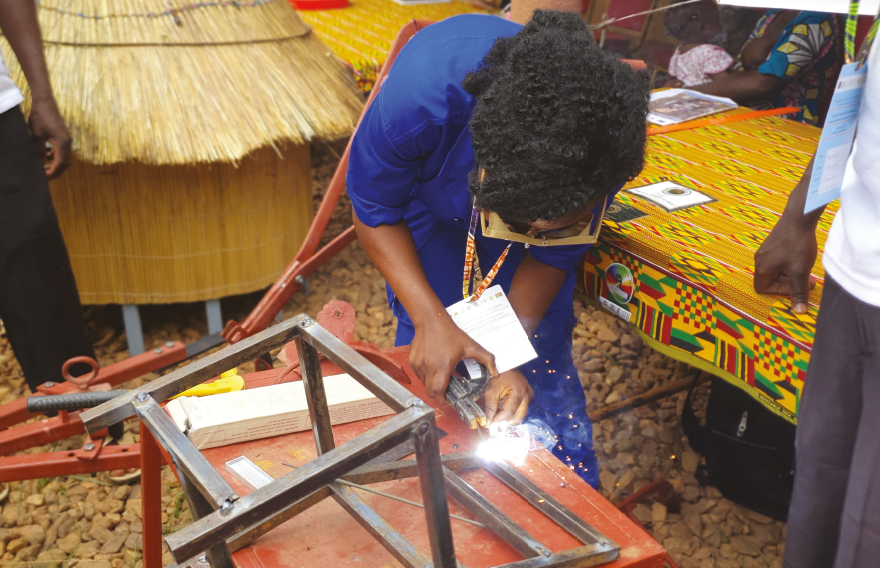
Contributing to regional stability by providing better economic outcomes and equal opportunities
THE EXAMPLE OF EMPLOYMENT SUPPORT IN PERIPHERAL AND BORDER AREAS OF BURKINA FASO
Funded by the EU Emergency Trust Fund, the employment support programme in border and peripheral areas of Burkina Faso targeted young people and women. © Odile Radisse
YACOUBA NAMOUTOUGOU
Coordinator of the Naya Dori project led by the Albarka N’djamdi organisation
“Our organisation received support from Expertise France to develop a training project for 40 young people in metal construction, welding and forging. The youths showed remarkable enthusiasm for the training programme, and all of them passed the examination to receive their basic qualification certificate. Thanks to Expertise France, the implementation of our activities was supported by the regional council, which improved our collaboration with that regional institution
as well as with beneficiary municipalities.”
ABOUBACAR SAWADOGO
Expert in training engineering
“The employment support programme implemented in border and peripheral areas
of Burkina Faso aimed to contribute to regional stability by tackling the root causes of instability, forced displacement and irregular migration, through the provision of enhanced economic outcomes and equal opportunities. Thanks to
this programme, 33 implementing partners were supported through local governance schemes based on regional empowerment. A total of 8,133 people were trained, 62.7% of whom were women.”
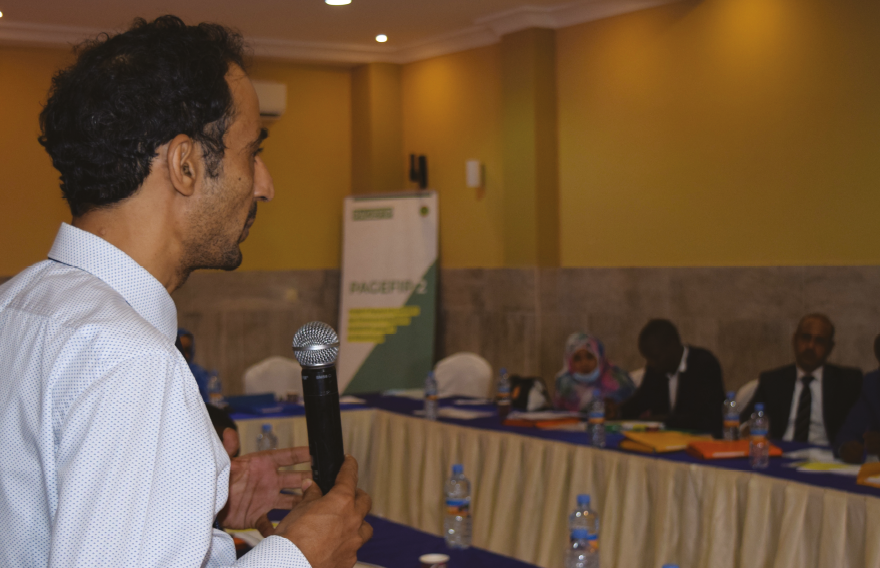
Increasing the transparency of public action and improving public finance management
THE EXAMPLE OF MAURITANIA
The PAGEFIP project (Public Finance Management Support Project), funded by the French government and the EU, aims to support Mauritania in reforming its public finance system. Here, a seminar in Nouakchott in November 2020. © MG ALL EVENT
MOHAMED LEMINE OULD DHÉHBY
Minister of Finance, Mauritania
“Over the last twenty years, Mauritania has been engaged in an ambitious process to modernise its institutions. The effective implementation of the public finance management reform is the keystone of a more comprehensive reform that involves not only the Ministry of Finance, but all State institutions. By working with Ministry officials, PAGEFIP technical experts are actively contributing to this major development and helping to make
this reform a success. The human and professional qualities of PAGEFIP experts, their dedicated work and their close collaboration with the senior executives of our department, in a spirit of sharing and know-how transfer, have proved instrumental
in the success of these reforms.”
KENZA BENNANI
Project Manager at the Economic and Financial Governance Department, Expertise France
“PAGEFIP is providing critical support to the implementation of Mauritania’s public finance reform over 2017-2022. Thanks to the three experts based in Nouakchott, alongside additional expertise provided through short-term missions, the Ministry of Finance receives coordinated, flexible support that is closely adjusted to needs. PAGEFIP’s contribution to State reform and modernisation will allow Mauritanian authorities to better steer their public policies in a health, economic and social context marked by acute uncertainty.”